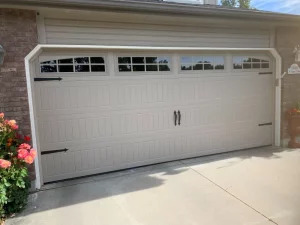
A well-maintained garage door can last for decades, but each component has its own lifespan. Understanding how long these parts typically last and the factors that affect their durability can help you plan for maintenance and replacements.
By knowing when to expect wear and tear, you can address issues proactively, ensuring that your garage door operates smoothly for years to come.
The Lifespan of Garage Door Springs
Garage door springs are crucial for the safe and efficient operation of your door. The two main types of springs—torsion and extension—each have different lifespans:
Torsion Springs: Typically last between 10,000 to 20,000 cycles, which usually equates to about 7 to 10 years. These springs are mounted above the door and offer more control over the door’s movement.
Extension Springs: Usually last about 7,000 to 10,000 cycles, or approximately 5 to 7 years. These are located on the sides of the door and stretch as the door closes.
Several factors impact the lifespan of springs, including usage frequency, maintenance, and environmental conditions like humidity. Regular inspections and timely lubrication are key to extending their life and preventing sudden breakages that could lead to further damage.
Rollers and Tracks: How Long Do They Last?
Rollers and tracks play a vital role in the smooth operation of your garage door by guiding its movement. The type and quality of rollers can significantly affect their lifespan:
Nylon Rollers: Known for their quiet operation, these can last up to 15 years, making them a popular choice for homeowners looking for durability.
Steel Rollers: Typically last around 7 to 10 years but may require more frequent lubrication to prevent rust and noise.
Maintaining clean and aligned tracks is crucial for smooth roller operation and reduced wear. Regularly checking for debris and straightening the tracks can help prevent any costly Boise Garage door repair.
Cables and Hardware Durability
Cables and hardware, including hinges, brackets, and other metal components, are essential for the safe operation of your garage door. On average, these parts last between 8 to 15 years, depending on usage and environmental exposure. Regular inspections can help you spot signs of wear, such as frayed cables or rusting hardware, which indicate it’s time for a replacement.
Neglecting these components can lead to more severe issues, like a door that suddenly stops working or becomes dangerous to operate. Proactively replacing worn parts can prevent emergencies and keep your garage door functioning smoothly.
Garage Door Opener Lifespan
The garage door opener is the engine behind your door’s movement, and its lifespan typically ranges from 10 to 15 years. Several factors influence its longevity:
Motor Type: Chain-drive openers may wear out faster than belt-drive models, which tend to operate more quietly and smoothly.
Usage Frequency: The more often you use your garage door, the sooner parts like gears and circuits may wear out.
Maintenance Practices: Regularly checking alignment, adjusting chain or belt tension, and replacing remote control batteries are simple tasks that can prolong the opener’s life.
Conclusion
Understanding the lifespan of your garage door components is key to proactive maintenance and avoiding unexpected issues. Regular inspections and timely replacements ensure your garage door continues to operate safely and efficiently.
For expert advice, a smooth Boise garage door repair and reliable services, contact Garage Door Store Boise. Our team is here to help you maintain your garage door, ensuring its longevity and your peace of mind.
